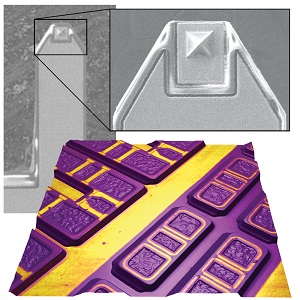Asylum Research, an Oxford Instruments company, announces Scanning Microwave Impedance Microscopy (sMIM), an atomic force microscopy (AFM) technique that enables nanoscale mapping of permittivity and conductivity with unprecedented sensitivity and resolution on any material including conductors, semiconductors and insulators.
 Proprietary shielded AFM probes localize the sMIM measurement to the tip, reducing stray capacitance and thereby increasing resolution and reducing artifacts. The inset image is a dC/dV amplitude image of an SRAM device where the contrast is proportional to dopant concentration.
Proprietary shielded AFM probes localize the sMIM measurement to the tip, reducing stray capacitance and thereby increasing resolution and reducing artifacts. The inset image is a dC/dV amplitude image of an SRAM device where the contrast is proportional to dopant concentration.
sMIM is the latest tool in Asylum’s “Beyond Topography” initiative which seeks to provide valuable nanomechanical and nanoelectrical information in addition to high resolution AFM topography. sMIM incorporates electronics and proprietary AFM probe technology developed by PrimeNano Inc. and is available integrated exclusively with Asylum Research MFP-3D™ and Cypher™ AFMs.
Nanoelectrical AFM modes have long been used in microelectronics R&D applications because they can provide valuable insight into device structure, function and failure. However, most conventional modes have been limited to measuring either resistance or capacitance and have required laborious sample preparation. sMIM is a dramatic improvement on these technologies because it senses sample variations in both conductivity (resistance) and permittivity (capacitance) while requiring only minimal sample preparation. These capabilities also make sMIM applicable to a broader range of samples, including ferroelectrics, piezoelectrics, and low-dimensional nanomaterials like graphene, boron nitride, and molybdenum disulphide.
“sMIM is the biggest advance in AFM nanoelectrical measurements that I’ve seen in my 12+ years working in this field,” said Keith Jones, Applications Scientist at Asylum Research. “Being able to visualize both conductivity and permittivity at the same time gives us a more complete picture of our samples. The sensitivity and resolution of the measurements is also way beyond the competitive technologies I have used throughout my career.”
“PrimeNano developed ScanWave™ sMIM based on core technology developed by Professor Zhi-xun Shen at Stanford University. A combination of exclusive shielded AFM probes and purpose-built electronics optimized for sMIM enable us to get results that are far superior to anything else out there,” explained Dr. Stuart Friedman, CEO of PrimeNano, Inc. “We are very pleased to partner with Asylum Research to offer an integrated sMIM solution. The capability of sMIM is even greater when combined with the world’s very best atomic force microscopes.”